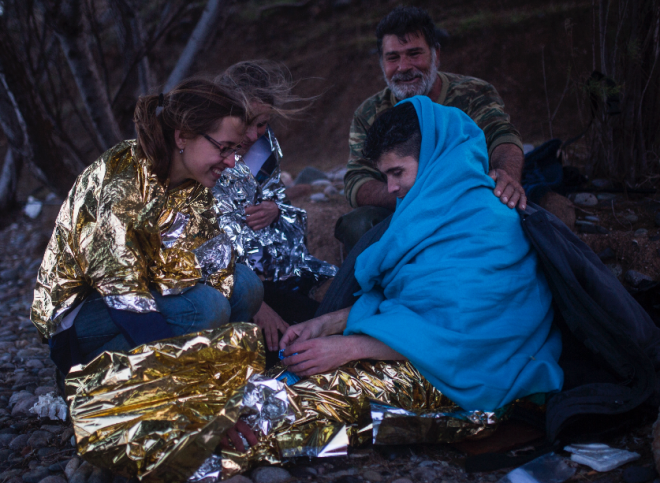
Volunteers try to warm up a refugee on a beach after being rescued by Spanish lifeguards from a capsized dinghy on the northeastern Greek island of Lesbos, Friday, Oct. 30, 2015. Greece’s prime minister lashed out Friday at European “ineptness” in handling the continent’s massive immigration crisis after 31 more people — mostly children — drowned in shipwrecks in the Mediterranean Sea. AP
GENEVA — More than 218,000 migrants and refugees crossed the Mediterranean to Europe in October — a monthly record and nearly the same number as in the whole of 2014, the United Nations said Monday.
“Last month was a record month for arrivals,” UN refugee agency spokesman Adrian Edwards told AFP, pointing out that “arrivals in October paralleled the entire 2014.”
In October, 218,394 people made the perilous crossing — all but 8,000 of them landing in Greece — compared to 219,000 arrivals during all of last year, UN figures showed.
The soaring numbers of arrivals last month brought to over 744,000 the number of people who have made the journey so far this year.
The October figures show that despite the increasingly harrowing conditions at sea at the onset of winter, refugees from Syria and other troublespots continue to pile into boats heading west, fearing that Europe is about to close its borders.
Among the more than 600,000 migrants and refugees who have crossed to Greece since the beginning of the year, 94 percent come from the world’s top 10 refugee-producing countries.
The ballooning number of crossings has had dire consequences, with the numbers of deaths piling up by the day.
Some 3,440 people have died or gone missing trying to cross the Mediterranean to Europe so far this year, according to UNHCR numbers last week.
The figures do not take into account the latest tragedy, with at least 15 migrants and refugees, including six children, drowning off Greece on Sunday when two boats making the hazardous crossing from Turkey capsized.
Most of the Mediterranean deaths this year have happened on the longer, more dangerous route to Italy, but with surging numbers attempting the far shorter crossing from Turkey to Greece, the death toll along that route has been mounting.
The latest tragedies bring the migrant death toll in Greece’s waters in the past month to over 80, many of them children, according to AFP’s count.
RELATED STORIES
Global warming to fuel migration, terrorism—report
Migrants’ long and winding road to Europe turns cold, muddy